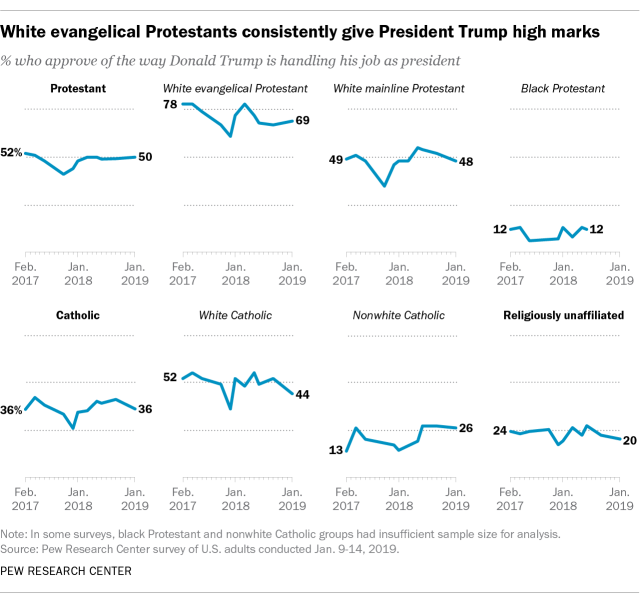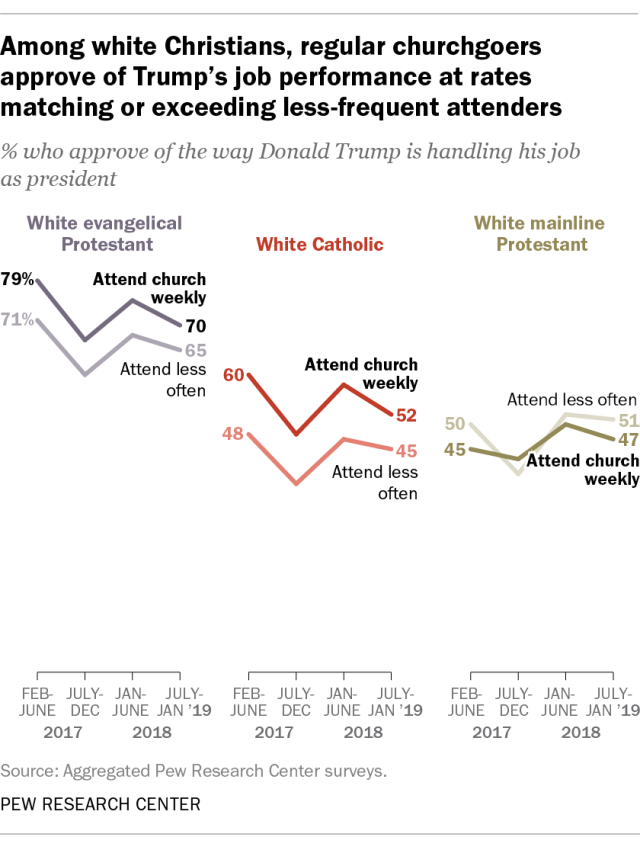https://world.wng.org/2019/04/unchurched_election
Pundits have written abundantly about evangelical support of Donald Trump, but they’ve mostly gotten it wrong. WORLD’s running survey of evangelical leaders in 2015 showed almost zero initial support for Trump. Not until his ascension left him as the only alternative to Hillary Clinton did he pick up broad support from church-going evangelicals, and the reason was obvious: the Supreme Court.
But weren’t evangelicals his key supporters during the crucial months in late 2015 and early 2016? Here’s where some fascinating work by Timothy Carney in his new book, Alienated America (Harper, 2019), breaks down the data and exposes the mistake that has taken hold. Carney’s summary: “The best way to describe Trump’s support in the Republican primaries—when he was running against the likes of Jeb Bush, Ted Cruz, Marco Rubio, John Kasich—would be: white evangelicals who do not go to church.”
Crunching numbers from the Voter Study Group, Carney and his research assistant Nick Saffran broke down by church attendance Republican voters in caucuses and primaries. Two out of 3 of the most frequent church attenders voted against Trump, but nearly 2 out of 3 of those who call themselves evangelicals but never go to church (a contradiction in terms) voted for him.
Carney compares the rural Iowa counties of Fremont and Winnebago, where the populations have similar incomes, similar educational attainment, similar unemployment, and similar crops, mostly corn and soy. One big difference: Winnebago, packed with churches, is one of the Top 10 Iowa counties in religious adherence, while Fremont, where churches were closing in 2013 and 2014, is 84th out of 99. Early in 2016 Trump received 19 percent of Winnebago’s votes, 43 percent of Fremont’s.

Trump’s worst county in Iowa, worse even than the counties housing the liberal University of Iowa and Iowa State, is highly churched Sioux County, which houses Dordt College. As dean of the World Journalism Institute, which holds our intensive college course at Dordt during the last two weeks of May every year, I’ve seen what a tight-knit place Sioux County is. Many residents are not looking for a Nietzschean superman to save them: They have a superman in their own homes—a faithful, hard-working dad—and they know a Superior Being looks after them.
Watch the evangelicals filling Sioux County churches on Sunday, and it’s no surprise that Trump did poorly there. Drive by closed or mostly empty churches in Buchanan County, Virginia’s little bit of Appalachia, and it’s no surprise that Trump did great in Buchanan. A Pew survey in March 2016 showed Trump down by 16 percentage points among white evangelical voters who attended church weekly, and up by 19 points among those who did not. Trump’s strongest support came among those unlikely to be in church but highly likely to say religion was important to them.
Carney points out how economic and religious institution collapse have followed parallel tracks in America. He cites a study by sociologist Brad Wilcox aptly titled “No Money, No Honey, No Church” and notes Wilcox’s finding that white Americans are less likely to attend religious services when they are unemployed: They’re also more susceptible to divorce.
It’s all part of a vicious cycle: Absent strong job prospects, fewer adults form families. Fewer weddings, fewer baptisms, fewer kids to teach about right and wrong: One result is less church involvement and a give-up attitude that among 10 percent of the populace worsens job prospects.
Pundits have written abundantly about evangelical support of Donald Trump, but they’ve mostly gotten it wrong. WORLD’s running survey of evangelical leaders in 2015 showed almost zero initial support for Trump. Not until his ascension left him as the only alternative to Hillary Clinton did he pick up broad support from church-going evangelicals, and the reason was obvious: the Supreme Court.
But weren’t evangelicals his key supporters during the crucial months in late 2015 and early 2016? Here’s where some fascinating work by Timothy Carney in his new book, Alienated America (Harper, 2019), breaks down the data and exposes the mistake that has taken hold. Carney’s summary: “The best way to describe Trump’s support in the Republican primaries—when he was running against the likes of Jeb Bush, Ted Cruz, Marco Rubio, John Kasich—would be: white evangelicals who do not go to church.”
Crunching numbers from the Voter Study Group, Carney and his research assistant Nick Saffran broke down by church attendance Republican voters in caucuses and primaries. Two out of 3 of the most frequent church attenders voted against Trump, but nearly 2 out of 3 of those who call themselves evangelicals but never go to church (a contradiction in terms) voted for him.
Carney compares the rural Iowa counties of Fremont and Winnebago, where the populations have similar incomes, similar educational attainment, similar unemployment, and similar crops, mostly corn and soy. One big difference: Winnebago, packed with churches, is one of the Top 10 Iowa counties in religious adherence, while Fremont, where churches were closing in 2013 and 2014, is 84th out of 99. Early in 2016 Trump received 19 percent of Winnebago’s votes, 43 percent of Fremont’s.

Trump’s worst county in Iowa, worse even than the counties housing the liberal University of Iowa and Iowa State, is highly churched Sioux County, which houses Dordt College. As dean of the World Journalism Institute, which holds our intensive college course at Dordt during the last two weeks of May every year, I’ve seen what a tight-knit place Sioux County is. Many residents are not looking for a Nietzschean superman to save them: They have a superman in their own homes—a faithful, hard-working dad—and they know a Superior Being looks after them.
Watch the evangelicals filling Sioux County churches on Sunday, and it’s no surprise that Trump did poorly there. Drive by closed or mostly empty churches in Buchanan County, Virginia’s little bit of Appalachia, and it’s no surprise that Trump did great in Buchanan. A Pew survey in March 2016 showed Trump down by 16 percentage points among white evangelical voters who attended church weekly, and up by 19 points among those who did not. Trump’s strongest support came among those unlikely to be in church but highly likely to say religion was important to them.
Carney points out how economic and religious institution collapse have followed parallel tracks in America. He cites a study by sociologist Brad Wilcox aptly titled “No Money, No Honey, No Church” and notes Wilcox’s finding that white Americans are less likely to attend religious services when they are unemployed: They’re also more susceptible to divorce.
It’s all part of a vicious cycle: Absent strong job prospects, fewer adults form families. Fewer weddings, fewer baptisms, fewer kids to teach about right and wrong: One result is less church involvement and a give-up attitude that among 10 percent of the populace worsens job prospects.



